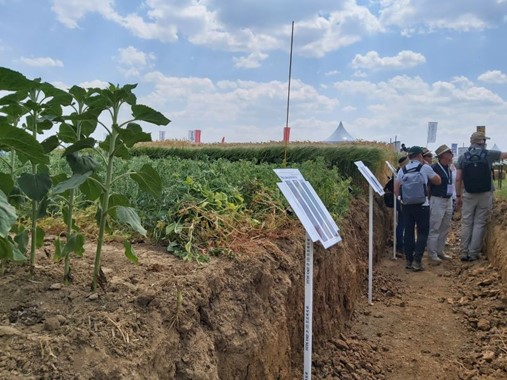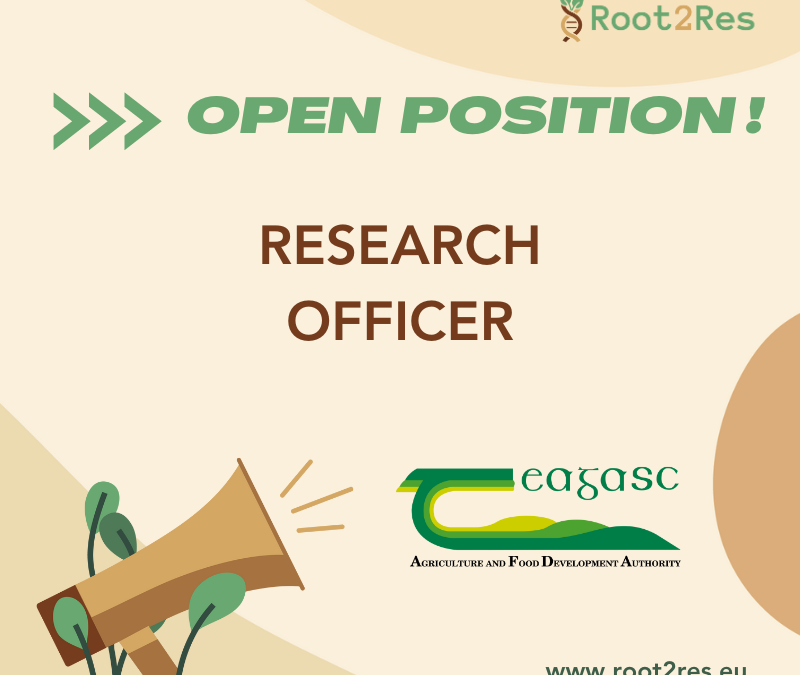Sharing innovations in precision phenotyping and root system analysis in Morocco

Root2Res invited farmers and breeders to a field exhibition, showcasing a long-demanded toolbox for rapid assessment of crop traits below ground
During the recent workshop in Morocco, stakeholders convened to explore the latest advancements in precision phenotyping and root system analysis. Hosted in the Mediterranean region experimental site on February 28th, the event served as a platform to showcase technologies developed through collaboration between ICARDA, INRA, and CIMMYT.
The workshop kicked off with an introduction to the Root2Res project, which set the stage for an in-depth exploration of cutting-edge agricultural technologies. This was followed by a demonstration of the ICARDA-INRA Heat and Drought Precision Phenotyping Platform. Developed in collaboration with the National Institute for Agricultural Research of Morocco (INRA) and the International Maize and Wheat Improvement Centre (CIMMYT), this precision phenotyping platform features a fully automated lysimeter, known as PhysioTron, housed within a rainout shelter. Equipped with a High-Throughput Phenotyping (HTP) system tailored for studies on drought and heat stress tolerance, this platform collects crucial data from various ICARDA strategic testing locations across its mandate region. These data are amalgamated and utilized to furnish elite germplasm to National Agricultural Research and Extension Systems (NARES) partners. Additionally, the HTP system utilized in Root2Res, stationed at ARVALIS’ sites in Ouzouer le Marché -a transitional agroclimatic zone in France- and Gréoux les Bains -Mediterranean climate, also in France-, was showcased, providing attendees with insights into its operational capabilities.
Learn about Root2Res objectives and partnership
Attendees also had the opportunity to familiarize themselves with the Phenobuggy — a tractor-mounted, GPS-assisted multi-sensor head. Discussions ensued regarding the crop traits measurable through these devices and their pivotal role in breeding schemes. Notably, the Phenobuggy enables rapid and precise measurement of phenotypic traits such as green fraction, senescence, vegetation indices, leaf area index, biomass, spike number, and plant height. Conversations underscored the importance of developing proxy approaches that connect above-ground measurements with root traits.
Subsequent sessions delved into soil coring, root seminal angle measurement using the clear pot method, and shovelomics sampling, along with data collection employing WinRhizo. WinRhizo, an image analysis system tailored for root measurement, encompasses morphology, topology, architecture, and color analyses. The significance of standardizing root system characteristics for image analysis was discussed, alongside recognition of error dependency on the response variable of interest, potentially influencing effect size and error probability. Method validation for each analyzed dataset was deemed essential. Furthermore, insights were shared on how root system morphology influences crop adaptation to diverse soil types, drawing upon the experiences of ICARDA and INRA across different experimental stations in Morocco.
The concluding segment of the workshop focused on data analysis, machine learning, and phenomic selection. Breeders emphasized the need for approaches facilitating precise evaluation of genetic variability in quantitative traits, given their pivotal role in breeding endeavors. This necessitates the deployment of accurate, rapid, and cost-effective evaluation tools. For intricate traits such as yield, genomic selection emerged as a viable option, leveraging genome-wide marker data to estimate breeding values. Alternatively, phenomic prediction, facilitated by multimodal machine learning models, seeks to predict the performance of untested individuals through the amalgamation of genomic, phenomic, and environmental data. Consensus among participants affirmed the compatibility of this predictive approach in augmenting genetic gains in plant breeding.
By fostering collaboration and sharing best practices in root system analysis and phenotyping, the workshop emerged as a pivotal forum for the exchange of pertinent information pertaining to the agropedoclimatic conditions and specificities of the Mediterranean experimental site chosen by Root2Res, or Agroclimatic Zone 3 (ACZ3). Local demonstrators can be found in this website’s homepage.
Recent posts












































